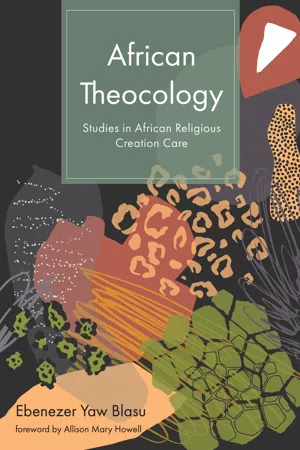![]()
Part 1
Moral Environmentalism
![]()
Chapter 1
Learning Environmental Science as Fact and as Faith
Introduction
The opening chapter sets the ultimate objective of this book as proposing African theocology to be an alternative but hopefully more effective curriculum for promoting moral and missional environmentalism than the traditional environmental science. However, it defined African theocology as essentially an environmental science, which necessarily needs to be in dialogue with other disciplines, particularly African religions and religious ethics. This chapter explores the understanding and concepts of environmental science as used in this book. More relevantly for the purpose of this book, it also discourses the potential of environmental science to motivate moral responsibility of students for creation care, particularly when studied within a holistic Christian framework. The definition of environmental science thus used is based on a personal experience of teaching the course at Presbyterian University College, Ghana as a mandatory undergraduate science subject in a general or an interdisciplinary study.
The Notion of Environmental Science (GNSP 101) as an Interdisciplinary Course at PUCG
Clearly, by its nomenclature, environmental science is from a two-term expression: environment and science. The Oxford Advanced Learner’s Dictionary, defines “environment” as the natural world in which people, animals and plants live. In their Environmental Science: A Global Concern textbook for undergraduate education, William Cunningham and Barbara Saigo define “environment” (from the French environner, to encircle or surround) as the circumstances or conditions that surround an organism or group of organisms. By these definitions, “the environment” connotes the idea that our surrounding is the space, time and other creatures around and amidst which we humans are, but minus us—at micro or macro levels. For Cunningham and Saigo it is the world (space and time) we inhabit, consisting of the natural world and the human-built world. The natural world or environment comprises the flora, fauna, soils, air, and water of the ecosphere (the Earth and the regions around it) that preceded us by billions of years and of which we are part. Brian Thomas Swimme and Mary Evelyn Tucker, authors of Journey of the Universe, inform us that the observable universe emerged 13.8 billion years ago, and we now live on a planet orbiting our sun, one of the trillions of stars in one of the billions of galaxies in an unfolding universe that is profoundly creative and interconnected. The human-built world, on the other hand, includes the sociocultural institutions and artifacts that we create for ourselves using science, technology and political organizations.
Science is a way of knowing. Many scientists claim it is a systematic, precise, objective way to study the natural world, employing creativity, skill and insight. The insistence on objectivity is because Francis Bacon, who was highly instrumental in developing modern science, stipulated that we are directly aware of reality (and he means scientifically) in only physical things. Science takes many different forms and is done in assorted ways by widely diverse people. But they have only one aim: to gain a neutral and unbiased comprehension of the natural world and the universality of its phenomena. The hope is to ultimately employ the knowledge gained in enhancing the estate of humanity, as Francis Bacon explained.
Ideally, scientific learning follows a series of logical, orderly steps. It begins with observing objects and phenomena in the natural world and formulating a provisional explanation or assumption called a hypothesis. Testing the hypothesis experimentally leads to collecting data (hard facts) that may be analyzed and interpreted, often by consulting the previous knowledge or hypotheses to draw conclusions or inferences of possibilities about the reality. Eventually, with evidence from a group of related investigations, scientists create a theory to explain a set of general principles. This is called positivist induc...
